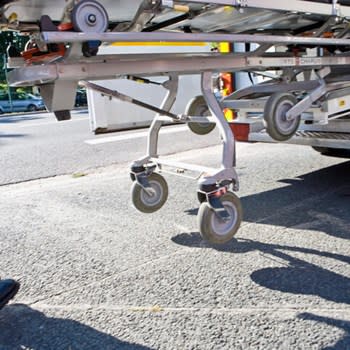Will Medicare Pay for a Wheelchair Ramp?
- Read about the costs of wheelchair ramps and when Medicare will pay for these home modifications. Discover other sources of funding for wheelchair ramps.
Wheelchairs and power scooters improve the quality of life for many older adults. These devices let people enjoy the outdoors, travel further distances and move around their homes with greater ease. However, many users need a wheelchair ramp installed to get their chairs in and out of the house.
Will Medicare pay for a wheelchair ramp? Unfortunately, Original Medicare rarely pays for wheelchair ramps. However, there are other ways to get funding.
The Cost of a Wheelchair Ramp
Wheelchair ramps can cost up to a few thousand dollars. Many factors affect the price of a wheelchair ramp, including:
- Local labor costs
- Materials
- How long the ramp needs to be
- Amount of weight the ramp will need to hold
Labor costs are a significant portion of wheelchair ramp costs. The total expense may be much lower if a friend, family member or volunteer group can install your ramp.
Materials also affect the price. Materials for wooden ramps tend to be more affordable, but these ramps can be challenging to build. They are also susceptible to wear and weathering. Aluminum ramps tend to be easier to install and maintain, but the materials might be more expensive.
Another factor affecting the price of a ramp is how many stairs lead to the place the ramp is accessing. A ramp that must reach a greater height must be longer and will likely be more expensive. Additionally, ramps that need to accommodate a powerchair must hold more weight, which can affect the cost.
Another option to buying a ramp is renting a wheelchair ramp. Rentals almost always include installation. Renting a ramp may be a cost-effective option for those who don't need a long-term ramp. A rental may be the best option for those recovering from an injury, end-of-life circumstances and people who will be moving away from their home soon.
Have Medicare questions?
Talk to a licensed agent today to find a plan that fits your needs.
Will Medicare Pay for a Wheelchair Ramp?
Original Medicare rarely pays for wheelchair ramps. Medicare Part B does provide coverage for Durable Medical Equipment, but coverage is only available for medically necessary equipment. Although a wheelchair ramp can make life easier for a beneficiary, Medicare doesn't view ramps as necessary.
However, some Medicare Advantage (MA) plans do pay for wheelchair ramps. Some MA plans offer healthcare benefits to cover items such as devices that help prevent injuries or provide for functional needs. MA plans may also cover Special Supplemental Benefits for the Chronically Ill. These benefits include some coverage for structural home modifications, including wheelchair ramps, to enrollees with chronic illnesses or medically complex conditions.
Does Medicaid Pay for Wheelchair Ramps?
Regular Medicaid doesn't pay for wheelchair ramps. Like Original Medicare, Medicaid doesn't consider these to be medically necessary devices. In rare cases, Medicaid has paid for ramps, but usually only after appeals and court involvement.
Home and Community-Based Services (HCBS) waivers through Medicaid may help pay for wheelchair ramps, though. A recipient can use funds from these waivers for equipment and services that will help keep the beneficiary from having to move into a nursing home. Because a wheelchair ramp may help a person stay in their own home, an HCBS waiver may provide coverage.
Is There Help For Veterans Who Need Wheelchair Ramps?
The Home Improvement and Structural Alterations (HISA) Grant program can help veterans pay for wheelchair ramps. HISA allows disabled veterans to modify their homes for improved accessibility, and the disability doesn't have to be related to the veteran's military service.
Other Assistance For Obtaining a Ramp
Even though Original Medicare won't pay for a wheelchair ramp, you may have access to other assistance depending on your financial circumstances and where you live. Many states have programs that offer assistance to older adults with limited mobility.
Some nonprofit programs also offer help for those in need of a wheelchair ramp, including:
- Habitat for Humanity's A Brush with Kindness Program
- Phi Beta Kappa's AccessABILITY Experience
- Rebuilding Together
- Senior Corps
You can find more information about assistance in your area through resources such as the federal government's Eldercare Locator as well as the Centers for Independent Living.
Loans from private financial institutions may be another option for those in need of a wheelchair ramp. Some financial institutions offer eldercare loans, which may be an option for those waiting on other benefits or funds. Reverse mortgages can also be an option for older adults in need of extra funds.



